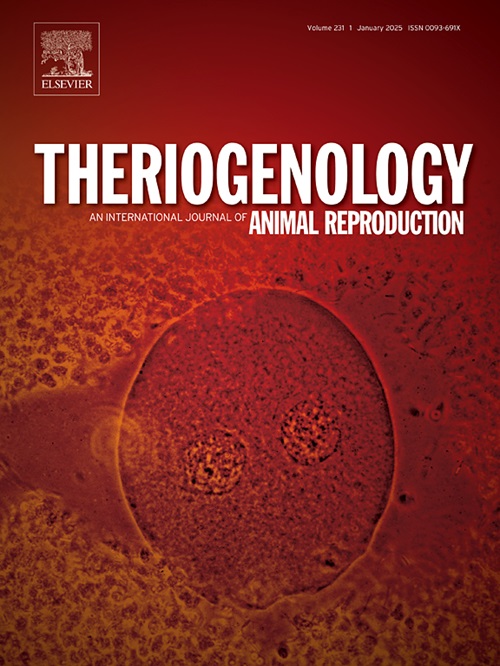Comparative evaluation of a commercial Tritrichomonas foetus vaccine in infected and uninfected bulls and heifers during a 45-day natural breeding season
IF 2.5
2区 农林科学
Q3 REPRODUCTIVE BIOLOGY
引用次数: 0
Abstract
Tritrichomonas foetus is a venereal protozoan parasite that causes significant reproductive losses in cattle. Bulls act as asymptomatic carriers, transmitting the pathogen to susceptible cows, leading to infertility, embryonic or fetal loss, and other reproductive disorders. With no FDA-approved treatments available, vaccination has become a key control strategy. This study evaluated the reproductive effects of a commercially available killed, whole-cell vaccine (TrichGuard®) administered to both heifers and T. foetus-positive bulls in a natural mating system.
Heifers and bulls were randomly assigned to one of four vaccine treatment groups. Pregnancy status was monitored, and statistical models assessed pregnancy maintenance and loss. A significant treatment effect was observed on the probability of maintaining pregnancy (P = 0.03), with control (uninfected) heifers showing the highest odds of retention. Vaccinated and infected groups all showed reduced odds of maintaining pregnancy, though post hoc comparisons showed no significant differences amongst any of the vaccination protocols. Pregnancy loss did not differ significantly between groups (P = 0.22). Survival analysis revealed a treatment effect (P = 0.04), driven by the absence of pregnancy loss in the control group.
These findings suggest that vaccination with the commercially available vaccine Trichguard® may have variable efficacy in reducing reproductive losses in the face of natural infection.
在45天的自然繁殖季节,对受感染和未受感染的公牛和母牛进行商业毛滴虫胎儿疫苗的比较评价
胎毛滴虫是一种性原生动物寄生虫,可导致牛的严重生殖损失。公牛作为无症状携带者,将病原体传播给易感奶牛,导致不育、胚胎或胎儿丢失以及其他生殖障碍。由于没有fda批准的治疗方法,疫苗接种已成为一项关键的控制策略。本研究评估了市售全细胞灭活疫苗(TrichGuard®)在自然交配系统中对小母牛和T.胎阳性公牛的生殖效果。小母牛和公牛被随机分配到四个疫苗治疗组中的一个。监测妊娠状况,统计模型评估妊娠维持和损失。在维持妊娠的概率上观察到显著的治疗效果(P = 0.03),对照组(未感染)母牛的保留几率最高。接种疫苗组和感染组都显示维持妊娠的几率降低,尽管事后比较显示在任何疫苗接种方案之间没有显着差异。两组间妊娠损失无显著差异(P = 0.22)。生存分析显示治疗效果(P = 0.04),由于对照组没有妊娠丢失。这些发现表明,接种市售的tricguard®疫苗在减少自然感染时的生殖损失方面可能具有不同的功效。
本文章由计算机程序翻译,如有差异,请以英文原文为准。
求助全文
约1分钟内获得全文
求助全文
来源期刊

Theriogenology
农林科学-生殖生物学
CiteScore
5.50
自引率
14.30%
发文量
387
审稿时长
72 days
期刊介绍:
Theriogenology provides an international forum for researchers, clinicians, and industry professionals in animal reproductive biology. This acclaimed journal publishes articles on a wide range of topics in reproductive and developmental biology, of domestic mammal, avian, and aquatic species as well as wild species which are the object of veterinary care in research or conservation programs.
 求助内容:
求助内容: 应助结果提醒方式:
应助结果提醒方式:


